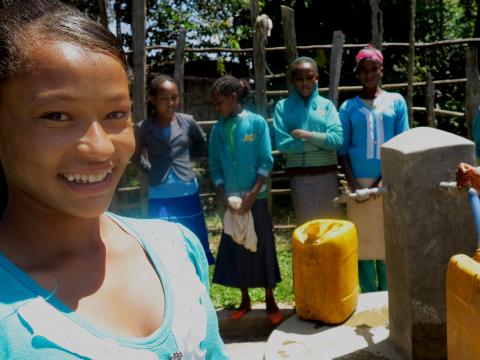Clean water brings more time for school

Darartu Daniel, a 13-year-old girl, is living with her parents in a rural part of Waliso district, Hadare village, 86 miles south west of Addis Ababa. She was born to a farming dad and a stay-at-home mom. She is an 8th grader and goes to Haroji Middle School. There are two shifts that change every semester. She prefers the afternoon shift to morning shift because it enabled her to assist her mom in doing house chores. Fetching water from streams and springs of the Hatade River that took her two hours to walk to and return home with her jerry can filled with unsafe drinking, was a routine she did twice a day.
In rainy season, the dirt road to the river became slippery and many mothers fell and suffered emotional and physical hurt. “For safety reasons, the old and infirm did not try going in winter,” said Darartu, “and opted for rainwater collected from corrugated iron sheet.” To make the situation worse, the spring water at the Hatade River dried up during the driest months of February to May. In these dry months the flow became a trickle and it took Darartu more than five minutes to fill her jerry can. When news of water scarcity was in the air, Darartu and the community shifted their search area. The unclean water, coupled with the rarity, posed a health threat to Darartu and community children.
Darartu placed her jerry can in a long line with other community women and girls of her age. The lines were first come, first serviced style. Carrying her jerry can filled with the unsafe drinking water which weighed 66 pounds and heavy for her age, Darartu trekked up the hill to her home. She often worried that she would not get to school on time.
Once home, Darartu hastily unloaded the jerry can, had quick lunch, slung her school bag on and ran to school so as not to miss class which she did on several occasions. At Daratu’s school, security guards had orders and were determined to keep away late comers. The difficult life experience left the children in Hadare village without hope.
World Vision’s integrated development program broke the cycle and dug a deep bore hole that brought safe drinking water to the community. Today, Daratu walks only five minutes to the water distribution point. “I never dreamt of having running water from a faucet. Thanks to World Vision, now we have it in this remote village,” she said with a glowing smile on her face. Darartu who sings in a choir has enough time to go to church to rehearse gospel songs.
The availability of the water has given her ample time to study text books given to her group and she enjoys the fellowship. “Since World Vision availed the water for us, I’ve never felt water borne disease, nor missed class. While I’m busy, even my siblings can get the water in small jerry cans in the morning and in the evening. Life is good with World Vision,” she said with vivid expression. The availability of clean drinking water at a nearby distance has brought joy to every child in Hadare village.